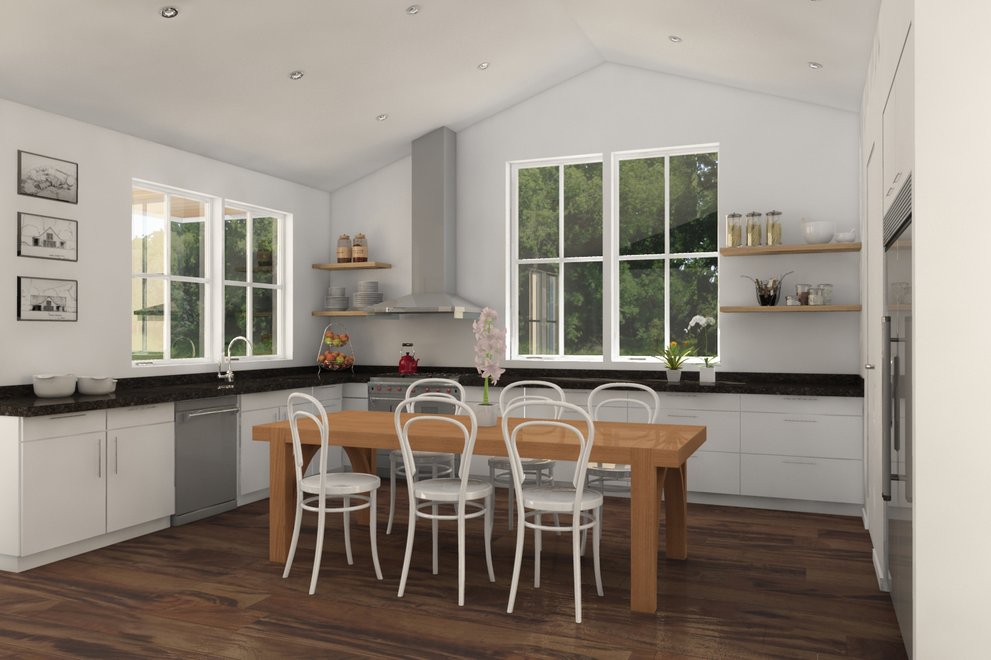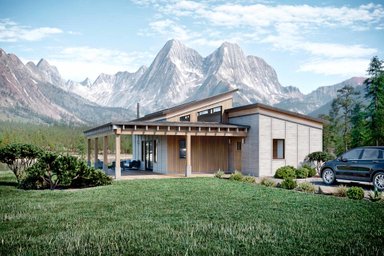You’ve decided you want to build a house, and now you need a builder. For information on the process of finding reputable builders, read this: http://blog.houseplans.com/article/how-to-choose-a-home-builder. Other than the ideas described in that article, Houzz.com is a great place to learn about builders, see photos of their work and read reviews from their past clients. Try to start your search at least a year before you want to start building. This will give you a large group of builders to choose from.
Once you have found a handful of builders that you think would be a good match, and it’s time to narrow the field to one, there are a few ways to go about doing this. There is no one right way to choose your builder, and the way you decide to approach this phase will depend on your comfort level with the builders, the detail on your plans, and your timeline. Below are the three most common approaches:
1. Negotiated bid / collaborative design. Here you have a stated budget and interest in working with a specific builder. You and the builder will work together either to design the project from scratch, value engineer an existing plan (i.e look for areas for cost cutting), or consult during design development, helping you decide on finish materials and other details you will need to know before a final contract amount can be reached. Assuming all parties remain satisfied during this process you reach a contract and proceed with the work. This approach is best when you do not have a complete set of plans and finish schedules, you have a builder you trust, and you have time to work through the details.
2. Traditional bidding. A package of information goes out to three contractors. There are plans with enough information to provide a final quote, and any design changes that are considered are listed as add/alts to be priced as well. Any questions that are answered by the architect or client during bidding are distributed to all contractors. The client gets three final quotes and picks a contractor. This approach is best if your plans are relatively complete and you don’t want someone to work through every detail to get it just right. If you want to start building by a certain date, the bidders will be giving you a price and a start date. It would seem like the competitive nature of this bidding process would get you the best price, but in my experience this is not generally the case. There is a high level of risk for builders bidding on a project in this fashion and they need to build a contingency into their number for this reason. They will need to bid on multiple projects at the same time to make sure they have work, and since all the bidders are operating under similar conditions, they do not have an incentive to provide the best price they could if they felt safe that the job was theirs.
3. Hybrid. Here, three contractors are engaged to provide a high level estimate, but not final quote, based on near complete plans. You use these estimates to select a builder to work with on a negotiated bid. You get the value of talking to multiple builders and good information about pricing, and the builder knows you are committed and can work to get you a good contract.
Popular Ranch house Plan 888-4 by Nicholas Lee -- the kitchen is shown at the top of the post.
Pros and Cons
#1. The advantage of #1 is that the contractor can commit more resources to the bidding process to help value engineer the project and home in on his best number because he has less risk and doesn't need to consider multiple projects at the same time.
#2. Since he won't get all the jobs he bids, time management is different because the builder needs to bid on several projects to be safe. In my opinion this approach also rewards contractors who come in low initially and issue change orders later. Every builder has different overhead, but in general, if you are comparing builders that are providing a similar level of customer service and producing a product at the same quality level, pricing is not going to vary much.
#3. I believe the approach described in #3 is the best. You have the peace of mind that the builder you choose is not overpricing the project because you have cost comparison, but you are able to negotiate the exact terms of the contract as partners. You and your builder will be entering into a long and involved relationship – make sure you are starting the relationship on the right foot.
To browse our collection of nearly 40,000 floor plans click here.
Once you have found a handful of builders that you think would be a good match, and it’s time to narrow the field to one, there are a few ways to go about doing this. There is no one right way to choose your builder, and the way you decide to approach this phase will depend on your comfort level with the builders, the detail on your plans, and your timeline. Below are the three most common approaches:
1. Negotiated bid / collaborative design. Here you have a stated budget and interest in working with a specific builder. You and the builder will work together either to design the project from scratch, value engineer an existing plan (i.e look for areas for cost cutting), or consult during design development, helping you decide on finish materials and other details you will need to know before a final contract amount can be reached. Assuming all parties remain satisfied during this process you reach a contract and proceed with the work. This approach is best when you do not have a complete set of plans and finish schedules, you have a builder you trust, and you have time to work through the details.
2. Traditional bidding. A package of information goes out to three contractors. There are plans with enough information to provide a final quote, and any design changes that are considered are listed as add/alts to be priced as well. Any questions that are answered by the architect or client during bidding are distributed to all contractors. The client gets three final quotes and picks a contractor. This approach is best if your plans are relatively complete and you don’t want someone to work through every detail to get it just right. If you want to start building by a certain date, the bidders will be giving you a price and a start date. It would seem like the competitive nature of this bidding process would get you the best price, but in my experience this is not generally the case. There is a high level of risk for builders bidding on a project in this fashion and they need to build a contingency into their number for this reason. They will need to bid on multiple projects at the same time to make sure they have work, and since all the bidders are operating under similar conditions, they do not have an incentive to provide the best price they could if they felt safe that the job was theirs.
3. Hybrid. Here, three contractors are engaged to provide a high level estimate, but not final quote, based on near complete plans. You use these estimates to select a builder to work with on a negotiated bid. You get the value of talking to multiple builders and good information about pricing, and the builder knows you are committed and can work to get you a good contract.
Popular Ranch house Plan 888-4 by Nicholas Lee -- the kitchen is shown at the top of the post.
Pros and Cons
#1. The advantage of #1 is that the contractor can commit more resources to the bidding process to help value engineer the project and home in on his best number because he has less risk and doesn't need to consider multiple projects at the same time.
#2. Since he won't get all the jobs he bids, time management is different because the builder needs to bid on several projects to be safe. In my opinion this approach also rewards contractors who come in low initially and issue change orders later. Every builder has different overhead, but in general, if you are comparing builders that are providing a similar level of customer service and producing a product at the same quality level, pricing is not going to vary much.
#3. I believe the approach described in #3 is the best. You have the peace of mind that the builder you choose is not overpricing the project because you have cost comparison, but you are able to negotiate the exact terms of the contract as partners. You and your builder will be entering into a long and involved relationship – make sure you are starting the relationship on the right foot.
To browse our collection of nearly 40,000 floor plans click here.






